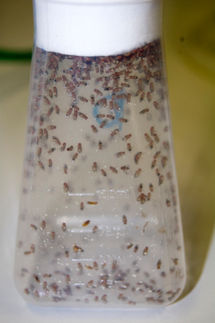To stop evolution: New way of fighting antibiotic resistance demonstrated by Scripps scientists
Advertisement
A team of scientists at The Scripps Research Institute and the University of Wisconsin have demonstrated a new way of fighting antibiotic resistance: by stopping evolution. In PloS biology, the team describes how a protein called LexA in the bacterium Escherichia coli promotes mutations and helps the pathogen evolve resistance to antibiotics. The scientists also show that E. coli evolution could be halted in its tracks by subjecting the bacteria to compounds that block LexA. Interfering with this protein renders the bacteria unable to evolve resistance to the common antibiotics ciprofloxacin and rifampicin. Since the evolution of resistance is under the control of LexA, compounds that block the protein might prolong the potency of existing antibiotics.
This research raises fundamental questions about evolution. Biologists have often thought about evolution in the same way many think about death and taxes -- something inevitable. For the last few years, Romesberg has led an effort to understand the genes that drive evolution, an innovative way of thinking because scientists have more often understood evolution as the force that drives genes. What underlies evolution is mutation. Because of the potential harm of mutations, humans and other mammals have evolved to make as few as possible. The machinery inside our cells has the ability to replicate our genomes extremely well, and the "polymerase" enzymes that replicate our DNA rarely make mistakes and additionally we have multiple, redundant repair and proofreading mechanisms.
Nevertheless, all organisms are prone to some level of damage because no replication machinery is perfect, and with large genomes of billions of bases of DNA to be copied many billions of times over the lifetime of an organism, a certain level of spontaneous mutations will occur. Scientists have generally thought that slowly over time, these mutations accumulate and species diverge. However, Romesberg and his colleagues believe that cells are not just the passive victims of random mutations, but have ways of initiating mutations in their own DNA. Evidence for this includes the fact that the rates of mutation in some cells does not seem consistent with the mutation rates associated with DNA replication. Some cells, like bacteria subjected to antibiotics, seem to acquire mutations at a much higher rate. Romesberg reasons that these rapid mutations may sometimes be part of a mechanism organisms have to rapidly evolve when they need to.
At the dawn of the 20th century, bacterial infections accounted for several of the leading causes of death in the United States. But then came the antibiotic revolution. Antibiotics are basically natural chemicals (or derivatives of natural chemicals) produced by other bacteria or fungi in the environment to kill off the competition. But in the last few decades, mutant strains of several types of bacteria with the ability to resist antibiotics have emerged. For years scientists have been combating drug resistance by coming up with new types of antibiotics, and for years bacteria have been evolving ways around these antibiotics. If one could design drugs to halt the enzymes that make mutations in bacteria, this could be a way of combating the evolution of antibiotic resistance.
Original publication: R. T. Cirz, J. K. Chin, D. R. Andes, V. de Crï'-Lagard, W. A. Craig, F. E. Romesberg; "Inhibition of Mutation and Combating the Evolution of Antibiotic Resistance"; PloS Biology 2005.



























































